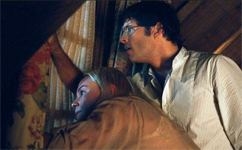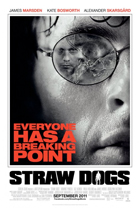Straw Dogs (2011)
|  Sam Peckinpah’s Straw Dogs (1971) was one of the most controversial films of its era, primarily because its complex depictions of the extremities of human violence were largely misunderstood, fueled in no small part by the director’s own penchant for goading his critics and purposefully speaking in grand generalizations in interviews. Forty years later we have writer/director Rod Lurie’s remake, which essentially turns the film into exactly the kind of primitive masculine revenge tale that the original’s detractors mistook it for. Well, not exactly: Lurie is no hack, and he clearly understands what Peckinpah was doing, which is why he maintains some elements of the original’s moral complexity. Yet, by the end the remake feels like it is doing little more than paying lip service, especially since Lurie chooses to end the film not on the original’s purposefully ambiguous line of dialogue about not knowing the way home, but rather with, “I got ’em all.” Sam Peckinpah’s Straw Dogs (1971) was one of the most controversial films of its era, primarily because its complex depictions of the extremities of human violence were largely misunderstood, fueled in no small part by the director’s own penchant for goading his critics and purposefully speaking in grand generalizations in interviews. Forty years later we have writer/director Rod Lurie’s remake, which essentially turns the film into exactly the kind of primitive masculine revenge tale that the original’s detractors mistook it for. Well, not exactly: Lurie is no hack, and he clearly understands what Peckinpah was doing, which is why he maintains some elements of the original’s moral complexity. Yet, by the end the remake feels like it is doing little more than paying lip service, especially since Lurie chooses to end the film not on the original’s purposefully ambiguous line of dialogue about not knowing the way home, but rather with, “I got ’em all.”Lurie recreates scene-for-scene (sometimes line-for-line) the screenplay penned by Peckinpah and David Zelag Goodman, which was adapted from Gordon Williams’ novel The Siege of Trenchers Farm, although he makes some key changes that were likely intended to make the story more comfortable and familiar to modern American audiences, but do nothing to improve or deepen the original. The story begins with the arrival of David and Amy Sumner (James Marsden and Kate Bosworth) in the small town where she grew up. The setting has been changed from the open, wintry plains of the Cornish countryside to the enclosed, swampy backwoods of Mississippi, thus turning the movie into a rather blunt Red State/Blue State political allegory. David, who was been transformed from a bookish experimental mathematician to a trendy, Harvard-educated Hollywood screenwriter, is still an immediate outsider in an alien culture, albeit now one with darkening shades of hillbilly horror. David is also no longer running away, as Dustin Hoffman’s character was in the original; rather, he is just looking for some peace and quiet in which he can finish his latest screenplay, a historical epic based on the Battle of Stalingrad. Peace and quiet are not to be found, however, as his smug, southern California presence immediately clashes with the backwoods, down-home folks who call the tiny town of Blackwater home. This is particularly true of Charlie Venner (Alexander Skarsgård), Amy’s chisled former high school flame who clearly knows that he lost something when she left and wants to get it back. It is not incidental that Lurie has made some significant changes to Amy’s character, as well. Whereas Amy in the original, played by Susan George, was significantly younger, less intelligent, and more overtly immature than David, she is now a failed Hollywood actress who, while not as adept at rattling off historical dates or playing chess as David, is much closer to his equal. This produces a notable shift in the character dynamics, particularly since it is clear that Lurie is less comfortable dealing with the uglier aspects of David and Amy’s personalities, which in Peckinpah’s film made the violence that much more disturbing because it forced the viewer to account for his or her own reactions, particularly when it came to rooting for the emotionally cruel David’s eventual stand at the end or justifying Amy’s victimization at the hands of Charlie and his buddies. Many viewers blamed Peckinpah for their moral compromise, when they should, in fact, have been looking into their own souls (as Peckinpah famously told one angry letter writer). Lurie’s film, while slick, well-acted, and genuinely effective in parts, is studiously lacking in that dimension; it slides off you, rather than forcing you to looking within. Those familiar with Peckinpah’s film will notice that Lurie recreates virtually all of it while losing the deeper textures and more complicated moral shadings. He isn’t willing to take the story to the true heart of darkness, instead being content to merely throw a few wrenches into the emotional works and then forget about them, such as the scene where David casually mocks Amy’s attempt to describe his writing. Of course, the most controversial sequence in the original film was a protracted rape in which Amy was attacked first by Charlie and then by his even more sadistic friend; viewers were rightly appalled by the sequence’s ambiguity in depicting Amy’s response to Charlie, a former lover to whom she still maintains a conflicted sense of attraction. Lurie keeps the scene functionally, but not in its essence, particularly because he simplifies Peckinpah’s complex cutting patterns that favored extreme close-ups, many that were directly from Amy’s perspective. Lurie’s approach to this scene and to the film as a whole is more conventional and ultimately lacks the courage of Peckinpah’s conviction and willingness to enrage viewers by challenging their moral complacency. Copyright ©2011 James Kendrick Thoughts? E-mail James Kendrick All images copyright © Screen Gems |
Overall Rating: 
 (2)
(2)


